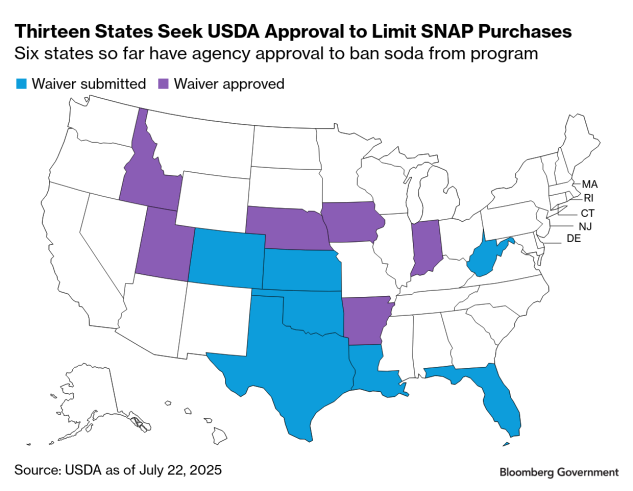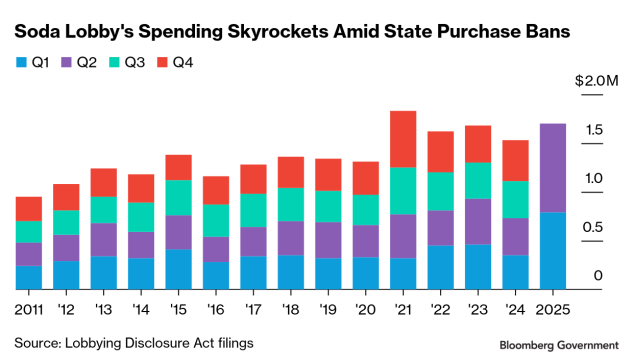Food and beverage influence groups boosted lobbying efforts as more than a dozen states seek to block federal food aid recipients from using benefits to purchase sugary products.
The American Beverage Association, which lobbies for
The spending increase reflects the Trump administration greenlighting first-ever bans on using Supplemental Nutrition Assistance Program benefits to buy items including soda and candy, set to take effect in several states by early 2026. Meanwhile, Congress is weighing whether to include similar SNAP purchase restrictions in key farm and food legislation it’s racing to renew by the end of the year.
Soda bans are the latest prong of a Republican-led push to reshape SNAP, the nation’s largest food aid program serving more than 42 million people a year. GOP lawmakers earlier in July slashed hundreds of billions from the program’s 10-year budget and expanded participant work requirements.
“I’m sure there’ll be a very lengthy discussion at the committee level,” Senate Agriculture Chair
RFK Jr. Seeks to Ban Soda Buying With Food Stamps in Health Push
The US Agriculture Department has so far approved two-year waivers in six states to limit soda purchases using SNAP dollars. Program rules already prohibit buying alcohol and hot foods.
As the debate unfolds, and with more state waivers in the queue, grocer groups and anti-hunger advocates have also warned limiting SNAP purchases could make it harder for recipients and retailers to use the program.
“Adding item-level restrictions to SNAP would drastically increase complexity for retailers,” the Food Research and Action Center wrote in May, adding: “This policy risks turning checkout lanes into battlegrounds, forcing grocery clerks to enforce confusing rules.”
Food Fight
Some food and drink companies also have escalated spending to influence policy directly.
PepsiCo spent nearly $2.8 million—up from $2.3 million during the same period in 2024—on its internal lobbying operation targeting issues including SNAP “purchasing restrictions” in the first half of 2025, according to Lobbying Disclosure Act filings. The company didn’t respond to requests for comment.
National Grocers Association influence spending also outpaced last year’s as the group met with Congress and USDA about matters including “SNAP restrictions.”
Stephanie Johnson, the association’s vice president of government relations, said the organization is in “ongoing discussions with department officials” about implementing SNAP purchase restrictions. The group has warned confusion about changes to the program could hurt independent grocers.
“We encourage the USDA and state agencies to work collaboratively with independent grocers to ensure guidance, training, and communication are clear and sufficient before any waiver changes take effect,” Johnson said in an emailed statement.
The American Beverage Association—which declined to comment for this story—added SNAP waivers to its registered lobbying activities for the first time in the second quarter of fiscal 2025.
Corn refiners, who make the high fructose corn syrup used as a sweetener in many of the soda and candies facing purchase limits under SNAP, are also concerned.
“We are disappointed that it has not yet been explained how the current waiver approach would further a meaningful evaluation of how to improve nutritional health,” Corn Refiners Association spokesperson Spencer Chase said in a statement.
The association spent a combined $360,000 lobbying so far in 2025 on issues including nutrition and is calling for “an evidence-based approach” to any SNAP food choice restrictions.
Policy Push
The lobbying boom comes as Agriculture Secretary Brooke Rollins has actively encouraged states to start limiting soda access, contrasting with the Biden administration’s approach.
So far, every state that’s sought to limit SNAP recipients’ purchasing options is led by a Republican governor—except for Colorado. Yet despite red-state enthusiasm and the Trump administration’s support, key farm and food policy lawmakers aren’t so sure about limiting how SNAP benefits can be spent.
Boozman, whose state is among those set to ban SNAP recipients from buying soda and candy in 2026, said he’s fielded concerns from sugar and grocer interests that an uptick in state-level purchasing bans could affect industry bottom lines. He plans to meet with Rollins to discuss how waivers could impact SNAP participation and industry income.
House Agriculture Chair
“I love the secretary, but I disagree—I believe in SNAP choice,” Thompson said.
Boozman and Thompson said they don’t plan to limit the authority Rollins has leveraged to approve purchasing restrictions nor do they want to cement those limitations in farm bill reauthorizations they’re working to introduce this fall.
Hilary Seligman, a food policy researcher at the University of California, San Francisco, said she’s concerned the purchase restriction approach is intended to reduce SNAP rolls by making it harder to use the program, rather than improve participants’ health. States have cited her work to support purchase restrictions.
“Fundamentally, people enrolled in SNAP drink too much soda and so does the rest of America, and so we have to figure out ways to support decreased soda consumption in the United States,” Seligman said. “But that’s a food system problem, it’s a food industry problem, it’s a food marketing problem—it’s not a SNAP problem.”
(Disclaimer: Michael Bloomberg has backed measures to curb sugar consumption and through Bloomberg Philanthropies has supported imposition of sugar taxes as part of obesity-prevention public health initiatives around the world. Michael Bloomberg is the majority owner of Bloomberg Government’s parent company.)
To contact the reporter on this story:
To contact the editors responsible for this story:



